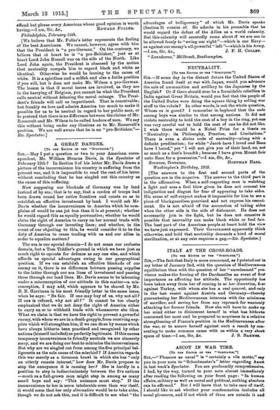A GREAT DANGER.
[To TR. EDITOR Or Tea ..SPECTLTOZ."]
Sin,—May I put a question or two to your American corre- spondent, Mr. William Stearns Davis, in the Spectator of February 13th? In Section 3 of his letter Mr. Davis draws a picture of the inconvenience his country is suffering from the present war, and it is impossible to read the rest of his letter without concluding that he has singled out this country as the cause of this suffering.
Now supposing our blockade of Germany was by land instead of by sea; that is to say, that a cordon of troops had been drawn round her entire frontiers and coasts so as to establish an effective investment by land. I would ask Mr. Davis whether the inconvenience to America which he com- plains of would be one jot less than it is at present; whether he would regard this as equally provocative; whether be would claim the right of America to carry on her normal trade with Germany through our investing lines; and whether, in the event of our objecting to this, he would consider it to be the duty of America to cease trading with us and our allies in order to equalize matters P
The sea is our special domain—I do not mean our exclusive domain, but a Tom Tiddler's ground in which we have just as much right to operate for defence as any one else, and which affords us special advantages owing to our geographical position. If we can establish an effective blockade of our enemy on it, there is no difference between passing supplies to the latter through our sea lines of investment and passing them through our land lines. Mr. Davis seems to be labouring under a misconception of our attitude in this matter—a mis- conception, I may add, which appears to be shared by Mr. E. E. Harriman in his most friendly letter in the same issue, when he says: "Be fair. If one may buy of us, why not all? If one is refused, why not all?' It cannot be too clearly emphasized that we do not deny the right of America either to carry on or to withhold trade with whomsoever she likes. What we claim is that we have the right to prevent a powerful enemy, with whom we are in a death grapple. from receiving sup- plies which will strengthen him, if we can dose by means which have always hitherto been practised and recognized by other nations (himself included) as perfectly legitimate. If this causes temporary inconvenience to friendly neutrals we are sincerely sorry, and we are doing our best to minimize the inconvenience. But why are we singled out from among the five principal bel- ligerents as the sole cause of the mischief ? If America regards this war merely as a tiresome brawl in which she has "only an utterly remote interest," how does Mr. Davis propose to atop the annoyance it is causing her? She is hardly in a position to step in indiscriminately between the five nations —much as a full-grown man might step in among as many small boys and say: "This nuisance must stop." If the inconvenience to her is more intolerable even than war itself, it would seem that her only alternative would be to take side, though we do not ask this, and it is difficult to see what "the
advantages of belligerency" of which Mr. Davis speaks (Section 9) consist of. He admita in his preamble that he would regard the defeat of the Allies as a world calamity. But this calamity will assuredly come about if we are not to be allowed freely to "swing our right"—which is our Navy— as against our enemy's all-powerful " left "—which is his Army.


































 Previous page
Previous page